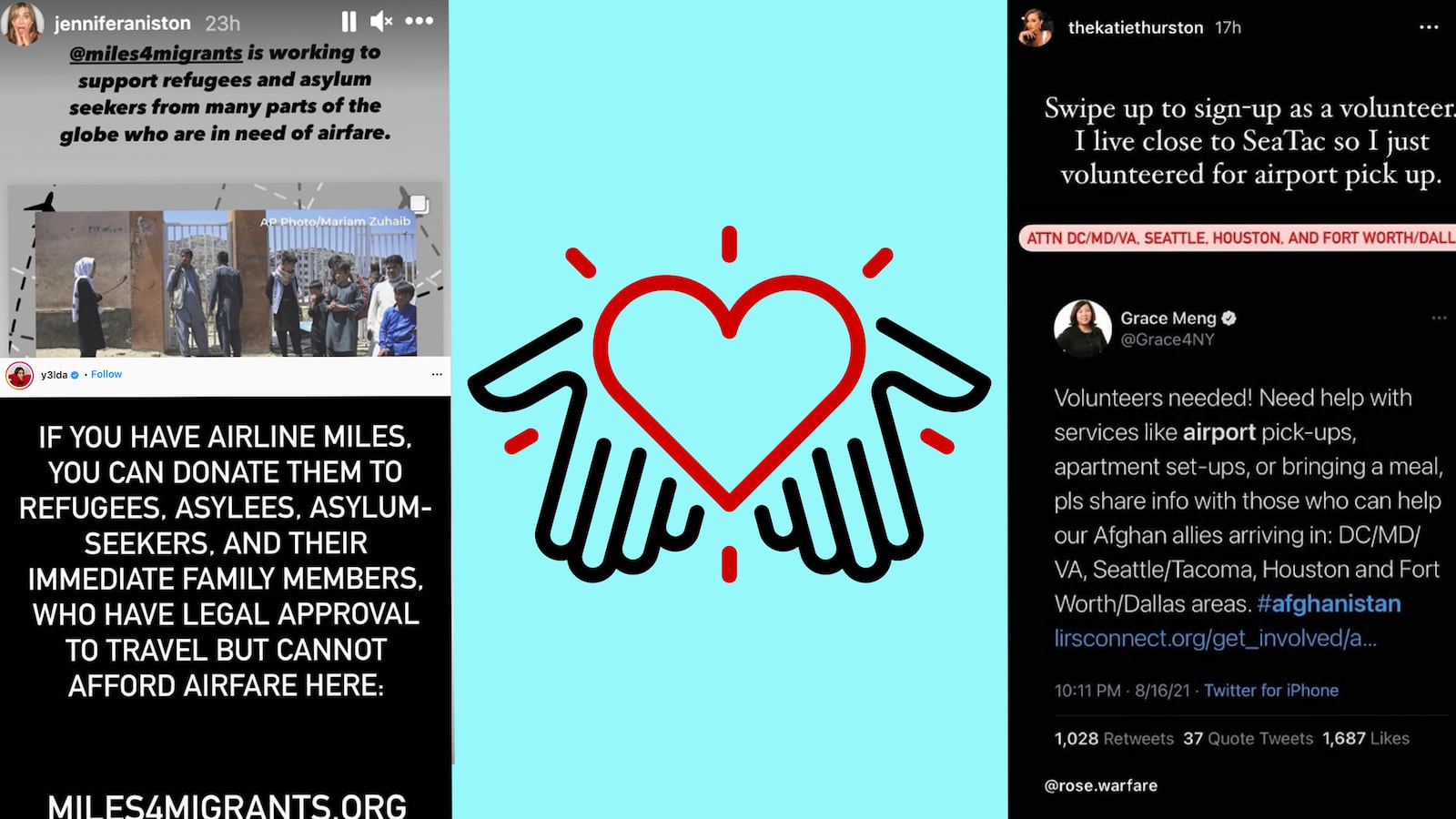News travels fast on social media, and apparently—when it comes to trying to help the people of Afghanistan—so does philanthropy.
While international relations don’t always dominate social media platforms like Instagram the way that funny memes, food pics, and vids and movie voiceovers do, the unfolding situation in Afghanistan and what’s happening in Kabul have hit a sore spot among digital natives and nomads like millennial and Gen Z Americans who have had the “War on Terror” as the backdrop to their youth for 20 years. Not to mention that two-thirds of Americans polled by the Associated Press think the two-decades-long Afghanistan war was a waste of time.
So internet dwellers are doing what they know how to do best: channeling their frustrations into helping the Afghan people and sharing ways to do so on social media.
Organizations like Miles4Migrants and LIRSConnect have gone viral, with posts of their URLs spreading like wildfire on platforms, through screenshots and post shares among people desperate to help in some way. LIRSConnect is a group that finds volunteers for things like local airport pickups, fostering minors, and even becoming pen pals with those who are in detention.
Miles4Migrants, an organization started in 2016, accepts airline mile donations and uses them to pay for refugees from other countries to get to the U.S. It has partnerships with different airlines, nonprofits, and the government to make the mile transfers and apply them to flights that refugees from other countries can use.
Andy Freedman, co-founder and managing director of Miles4Migrants, told The Daily Beast the last time he saw this level of donations was in 2018 during the child-separation crisis at the southern border. He says a tweet from a lawyer who donated to them went viral resulting in 38 million donated miles. The same thing happened this week, with someone else who is unknown.
“In four days we’ve received over 120 million miles, much due to that viral element. It’s very organic,” he said.
While social media-driven relief efforts aren’t new, the impact of the pandemic doesn’t seem to have dampened many Americans’ compassion—a contrast to how they’ve historically responded to welcoming outsiders into the country.
In 2015, a little more than half of those polled said they did not want Syrian refugees coming here. Despite Republicans and MAGA supporters already ramping up their anti-immigration attacks, social media currently indicates it’ll be a lot harder to convince people not to help—mainly because they’ve already started. (There hasn’t been a poll on how U.S. citizens feel about welcoming Afghan refugees yet.)
Biden’s rocky and slow start on formulating a plan to ensure Afghan refugees’ safe entry into the U.S. could have contributed to the people’s desperation to act. First, with a record-low cap on refugee admissions and then adding more only after he got heat for it, and now, finally, allowing thousands more in. Or will, at some point.
But the internet waits for no one, not even the president. Posts advertising how to donate miles, rally mental health professionals, or sign up for airport pick-up spread the word on Instagram among both average and high-profile users, including Jennifer Aniston and former Bachelorette star Katie Thurston, who shared a screenshot to the LIRSConnect link in her Instagram Stories.
This falls in line with Americans’ natural inclination to want to help, according to Dr. Josephine Lukito, a Senior Faculty Research Associate at The University of Texas at Austin’s Center for Media Engagement.
Lukito says that we’ve seen this desire to do something in the past with natural disasters, but the virality of charities who claim to want to help with Afghanistan efforts seems even more robust.
“For some folks, there’s a tethering between the U.S. and Afghanistan that may not have existed in previous situations,” she says. “With social media, this process has become much easier for things to go viral.”
Lukito believes that social media philanthropy is going to become even more common: “Charity work increases engagement and makes you feel good and makes you stay [on the platform] and that’s what these platforms want. It works well for the charity, it works well for the social media platform, and if it’s a good charity, ideally it’s good for the person donating as well.”
While it might feel good to make a donation or sign up to volunteer, there is one glaring issue with the current crisis in Afghanistan: refugees may not be able to get on a plane to get over here to begin with. The BCC reports that the Taliban has beaten some people who have been authorized to leave before ever getting to the airport, and commercial flights have been grounded as of publishing time.
Miles4Migrants posted a similar update on its site, stating that flights were unable to be booked at the moment, but miles will be used as soon as flights are cleared. Freedman confirmed that the 23 individuals who were set to fly from Afghanistan to the U.S. with donated miles are in an indefinite limbo. However, when they’re ready to fly, and when more flights can be booked, Freedman says that the donor is notified.
However, some people may feel apprehensive about donating to a group that goes viral on social media, and rightly so. Charity scams occur all the time. According to CharityWatch.org, the best way to prevent getting scammed is to do self-vetting, even if a friend shared the charity. People should also give directly to the group instead of a third party, and look at the website to see if it’s up-to-date or search the name of the organization through the IRS’ database. Lukito also says Googling the charity name and the words “scam” can help uncover past reviews.
Even as the majority of charities are able to help, the question remains: what happens when the refugees actually get here? The Biden administration’s Office of Refugee Resettlement works with local communities to place refugees, but it’s unclear what the plan for Afghanistan refugees is. The ORR and LIRSConnect did not return The Daily Beast’s requests for comment. While the Biden administration has worked with Miles4Migrants on the child separation crisis at the border, Freedman says they have yet to be in touch about the refugees in Afghanistan.
That isn’t stopping people on the internet from putting in the work.
Comic artist Rachel Dukes told The Daily Beast that she donated 2,000 miles to Miles4Migrants in 2020 to help reunite children with family members after hearing of the program, she thinks, through social media. She donated this year, too. Her original donation was meant for Afghanistan relief, but was told she needed at least 15,000 points to book a single flight, so, her points will be pooled for a charity that is able to combine miles. She’s willing to wait.
“What it really boils down to is that the world is vast and chaotic. I want to help others when I can, in whatever ways I can. Sometimes that’s money, or miles, sometimes that’s time, expertise, or physical prowess,” she said.






